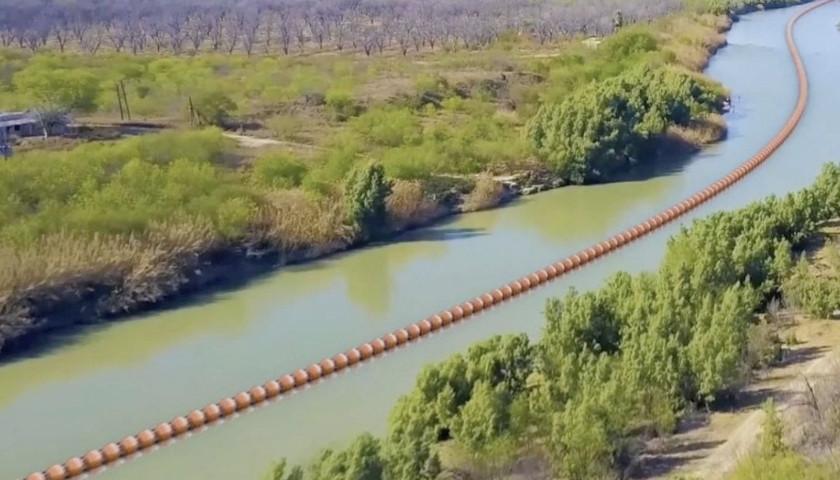by Bethany Blankley
A federal judge ruled Wednesday in a lawsuit brought by the U.S. Department of Justice that Texas Gov. Greg Abbott installing marine barriers in the Rio Grande River is illegal. After the ruling, Abbott said Texas was appealing.
Two lawsuits were filed over the marine barriers: one by the federal government and one by a Texas-based kayaking company seeking to end Abbott’s border security mission, Operation Lone Star. The ruling issued on Wednesday relates to the federal case only.
The federal lawsuit was filed in the U.S. District Court for the Western District of Texas Austin Division. The federal judge presiding over the case, Judge David A. Ezra, on Wednesday granted the DOJ’s motion for a preliminary injunction.
Most news outlets reported that Ezra ordered Abbott to remove the marine barriers from the river altogether. According to his order, he required that the barriers be moved closer to Texas land.
Ezra issued the injunction arguing the DOJ “will likely succeed on the merits of its Section 10 RHA claim against Texas.” He also held that the marine barrier “is an obstruction to the navigable capacity of the Rio Grande River and required authorization from Congress” and “is a structure in a navigable water of the United States, and thus required a permit from the Army Corps of Engineers.”
He also referenced Abbott’s position “that he was not ‘asking for permission’ for Operation Lone Star” to install the marine barrier, adding, “Unfortunately for Texas, permission is exactly what federal law requires before installing obstructions in the nation’s navigable waters.”
Ezra also ruled that “Texas’s self-defense argument is unconvincing” and took issue with Texas’ constitutional right to defend its border. “Whether Texas has been ‘invaded’ is a nonjusticiable political question,” he said, stating “the federal government’s power to prevent unauthorized obstacles in the nation’s navigable waters trumps state policy preferences.”
He also ruled that “Texas’s conduct irreparably harms the public safety, navigation, and the operations of federal agency officials in and around the Rio Grande.”
The order prohibits the state of Texas and “anyone working on their behalf … from building new or placing additional buoys, blockades, or structures of any kind in the Rio Grande River pending final judgement in this matter.”
Ezra ordered Texas to reposition the marine barriers by Sept. 15, and added a footnote to clarify his instruction. Footnote 32 states, “With respect to the buoy barrier that is currently in place, this is a Preliminary Injunction and not a final disposition of this case on the full merits, so this Court is counseled to act in a measured way. As a result, the Court is directing that the buoy barrier be moved from the main waters of the Rio Grande River to the riverbank, rather than removal entirely from the river, so that the barrier does not impede or impair in any way navigation by airboats or other shallow draft craft along the Rio Grande River.”
He said the barriers can be moved “in a rather expeditious manner, as the Governor himself ordered movement of the buoy barrier, which the federal government maintained was in part in Mexican waters to a position closer to the United States side of the river. … This was done within a period of three days and required only the use of a floating barge and airboats.”
Texas has maintained that Texas doesn’t need federal permission and the Rio Grande River isn’t a “navigable river” according to federal statute.
Abbott maintains in response to the DOJ’s claim that Texas violated the Rivers and Harbors Act that it “misses the mark. In that statute, Congress decreed that ‘it shall not be lawful to build . . . any wharf, pier, dolphin, boom, weir, breakwater, bulkhead, jetty, or other structures in any . . . water of the United States.’
“To state the obvious, that statute does not describe any action by the State of Texas.”
In a brief filed on behalf of 22 members of Congress, the Texas Public Policy Foundation pointed out that the federal government is required to produce evidence that the river it seeks to regulate is navigable for the purposes of interstate commerce. The only “evidence” it’s used to support its claim is a 1984 letter from the U.S. Coast Guard that points to a 1947 claim by the Coast Guard that the river was navigable. TPPF says, “this is not sufficient.”
In response to Wednesday’s ruling, Abbott said in a statement, “Texas will appeal.”
“Today’s court decision merely prolongs President Biden’s willful refusal to acknowledge that Texas is rightfully stepping up to do the job that he should have been doing all along,” he said. “This ruling is incorrect and will be overturned on appeal.”
“We will continue to utilize every strategy to secure the border, including deploying Texas National Guard soldiers and Department of Public Safety troopers and installing strategic barriers. Our battle to defend Texas’ sovereign authority to protect lives from the chaos caused by President Biden’s open border policies has only begun.”
He also reiterated what he’s previously said: “Texas is prepared to take this fight all the way to the U.S. Supreme Court.”
– – –
Bethany Blankley is a contributor to The Center Square.
Photo “Marine Barriers” by Texas Department of Public Safety.





